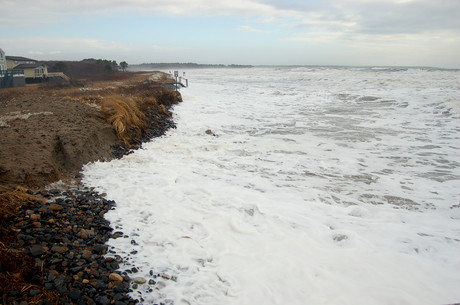The Wrack
The Wrack is the Wells Reserve blog, our collective logbook on the web.
The Wrack is the Wells Reserve blog, our collective logbook on the web.
 Unprecedented flooding in New York City rekindled the national debate regarding climate change, sea level rise, and the fate of coastal communities. While the deniers and alarmists take turns needling one another no end, many others have begun to unify around meaningful planning for an uncertain future.
Unprecedented flooding in New York City rekindled the national debate regarding climate change, sea level rise, and the fate of coastal communities. While the deniers and alarmists take turns needling one another no end, many others have begun to unify around meaningful planning for an uncertain future.
For 10 years, Orrin H. Pilkey has warned that sea level rise may lead to global catastrophe. Our collective human desire to be at the edge of the sea, whether for sustenance, aesthetics, or commerce, has led people to settle densely along coastlines that are increasingly at risk — as Hurricane Sandy brought into sharp focus. Pilkey made a timely point in his recent op-ed piece for The New York Times: Rebuilding in areas destroyed by storm surge is irresponsible.
A week later, three coastal ecologists from Virginia Tech (James D. Fraser, Sarah M. Karpanty, and Daniel H. Catlin) echoed the argument in the Washington Post:
Retreat from the sea will be painful no matter how it is executed, but it will hurt most if Americans continue to try to protect all existing infrastructure until the sea destroys it and if we repeatedly rebuild in the same places.
A forum held in Boston last weekend gave residents there a chance to find out how their city would be affected — and to think about how they might react — if a major storm surge hit dead on.
What-if scenarios are only as good as the computer models behind them so Fraser, Karpanty, and Catlin, among others, are quick to admit that "projections are notoriously tough to get right." But setting aside climate-change and sea-level-rise forecasts, they make a constructive comment: Long-term planning in coastal communities "must be a collaborative effort of the multiple stakeholders with diverse interests in coastal values."
 The Wells Reserve has just launched a 2-year study with exactly that mindset. With help from researchers out of the Consensus Building Institute (CBI) and the Massachusetts Institute of Technology (MIT), the reserve is experimenting with a new method to understand infrastructure concerns and to develop climate adaptations tailored specifically for the Town of Wells.
The Wells Reserve has just launched a 2-year study with exactly that mindset. With help from researchers out of the Consensus Building Institute (CBI) and the Massachusetts Institute of Technology (MIT), the reserve is experimenting with a new method to understand infrastructure concerns and to develop climate adaptations tailored specifically for the Town of Wells.
We'll report on this experimental study in the coming weeks and, for Wells residents, let you know when you can have your voice heard. Meanwhile, if you deal directly with coastal planning and management, here in Wells or around the region, we want you to know about an intensive 3-day climate-adaptation workshop coming up right here in January. Visit our calendar and stay tuned.